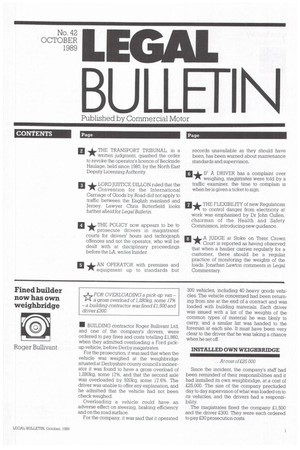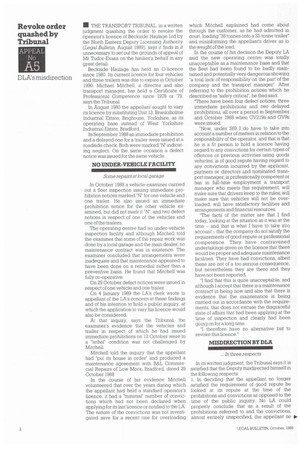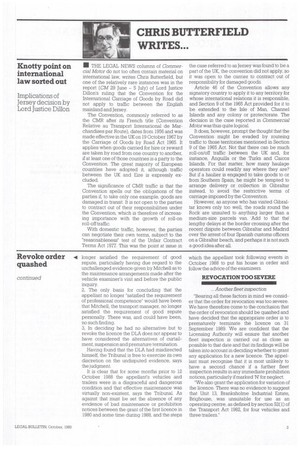FOR OVERLOADING a pick-up van kA a gross overload of
Page 149

Page 150

Page 151

If you've noticed an error in this article please click here to report it so we can fix it.
1,280kg, some 17% a building contractor was lined £1,500 and driver £300.
I. BUILDING contractor Roger Bullivant Ltd, and one of the company's drivers, were ordered to pay fines and costs totalling £1,860, when they admitted overloading a Ford pickup vehicle, before Derby magistrates.
For the prosecution, it was said that when the vehicle was weighed at the weighbridge situated at Derbyshire county council's incinerator it was found to have a gross overload of 1,280kg, some 17%, and that the second axle was overloaded by 920kg, some 17.6%. The driver was unable to offer any explanation, and he admitted that the vehicle had not been check weighed.
Overloading a vehicle could have an adverse effect on steering, braking efficiency and on the road surface.
For the company, it was said that it operated 300 vehicles, including 40 heavy goods vehicles. The vehicle concerned had been returning from site at the end of a contract and was loaded with building materials. Each driver was issued with a list of the weights of the common types of material he was likely to carry, and a similar list was handed to the foreman at each site. It must have been very clear to the driver that he was taking a chance when he set off.
INSTALLED OWN WEIGHBRIDGE ... At cost of125 000 Since the incident, the company's staff had been reminded of their responsibilities and it had installed its own weighbridge, at a cost of £25,000. The size of the company precluded day to day supervision of what was loaded on to its vehicles, and the drivers had a responsibility.
The magistrates fined the company £1,500 and the driver £300. They were each ordered to pay £30 prosecution costs. • THE TRANSPORT TRIBUNAL, in a written judgment quashing the order to revoke the operator's licence of Beckside Haulage Ltd by the North Eastern Deputy Licensing Authority (Legal Bulletin, August 1989), says it finds in it unnecessary to set out the grounds of appeal of Mr Tudor-Evans on the haulier's behalf in any great detail.
Beckside Haulage has held an 0-licence since 1980. Its current licence for four vehicles' and three trailers was due to expire in October 1990. Michael Mitchell, a director and also transport manager, has held a Certificate of Professional Competence since 1978 or '79, says the Tribunal.
In August 1980 the appellant sought to vary its licence by substituting Unit 13, Branksholme Industrial Estate, Brighouse, Yorkshire, as its operating base instead of West Yorkshire Industrial Estate, Bradford.
In September 1988 an immediate prohibition and a delayed one for a trailer were issued at a roadside check. Both were marked "N" indicating neglect. On the same occasion a defect notice was issued for the same vehicle.
NO UNDER-VEHICLE FACILITY Some repairs at local garage In October 1988 a vehicle examiner carried out a fleet inspection issuing immediate prohibition notices marked "N" for one vehicle and one trailer. He also issued an immediate prohibition notice for the other vehicle examined, but did not mark it "N". and two defect notices in respect of one of the vehicles and one of the trailers.
The operating centre had no under-vehicle inspection facility and although Mitchell told the examiner that some of the repair work was done by a local garage and the main dealer, no maintenance contract was in existence. The examiner concluded that arrangements were inadequate and that maintenance appeared to have been done on a remedial rather than a preventive basis. He found that Mitchell was fully co-operative, On 29 October defect notices were issued in respect of one vehicle and one trailer.
On 4 January 1989 the LA's clerk wrote to appellant of the LA's concern at these findings and of his intention to hold a public inquiry, at which the application to vary his licence would also be considered.
At that inquiry, says the Tribunal, the examiner's evidence that the vehicles and trailer in respect of which he had issued immediate prohibitions on 12 October were in a "lethal" condition was not challenged by Mitchell Mitchell told the inquiry that the appellant had "put its house in order" and produced a maintenance agreement with B&L Commercial Repairs of Low Moor, Bradford, dated 29 October 1988.
In the course of his evidence Mitchell volunteered that over the years during which the appellant had held a standard operator's licence, it had a "minimal" number of convictions which had not been declared when applying for its last licence or notified to the LA. The nature of the convictions was not investigated save for a recent one for overloading which Mitchell explained had come about through the customer, as he had admitted in court, loading "38 tonnes onto a 32-tonne trailer" and misinforming the appellant's driver as to the weight of the load.
In the course of his decision the Deputy LA said the new operating centre was totally unacceptable as a maintenance base and that the fleet had been found to be badly maintained and potentially very dangerous showing °a total lack of responsibility on the part of the company and the transport manager". After referring to the prohibition notices which he described as "safety critical", he then said: "There have been four defect notices, three immediate prohibitions and two delayed prohibitions, all over a period in September and October 1988 when GV219s and GV9s were issued.
"Now, under S69 I do have to take into account a number of matters in relation to the responsibility of the operator, and that is that he is a fit person to hold a licence having regard to any convictions for certain types of offences or previous activities using goods vehicles; is of good repute having regard to any convictions incurred by the applicant, partners or directors and nominated transport manager; is professionally competent or has in full-time employment a transport manager who meets this requirement; will make sure that drivers keep to the rules; will make sure that vehicles will not be overloaded; will have satisfactory facilities and arrangements and financial resources.
"The facts of the matter are that I find today, looking at the situation as it was at the time and that is what I have to take into account that the company do not satisfy the requirements of good repute or professional competence. They have contravened undertakings given on the licence that there would be proper and adequate maintenance facilities. They have had convictions, albeit these are not of a too serious consequence, but nevertheless they are there and they have not been reported.
"I find that this is quite unacceptable, and although I accept that there is a maintenance contract in being now and also that there is evidence that the maintenance is being carried out in accordance with the requirements, that does not excuse the disgraceful state of affairs that had been applying at the time of inspection and clearly had been going on for a long time.
"I therefore have no alternative but to revoke this licence."
MISDIRECTION BY DLA ... In three respects In its written judgment, the Tribunal says it is satisfied that the Deputy misdirected himself in the following respects: 1, In deciding that the appellant no longer satisfied the requirement of good repute he looked at its repute at the time of the prohibitions and convictions as opposed to the time of the public inquiry. No LA could properly conclude that as a result of the prohibitions referred to and the convictions, almost entirely unspecified, the appellant no • • longer satisfied the requirement of good repute, particularly having due regard to the unchallenged evidence given by Mitchell as to the maintenance arrangements made after the vehicle examiner's visit and before the public inquiry.
2, The only basis for concluding that the appellant no longer "satisfied the requirement of professional competence" would have been that Mitchell, the transport manager, no longer satisfied the requirement of good repute personally. There was, and could have been, no such finding.
3, In deciding he had no alternative but to revoke the licence the DLA does not appear to have considered the alternatives of curtailment, suspension and premature termination.
Having found that the DLA had misdirected himself, the Tribunal is free to exercise its own discretion on the undisputed evidence, says the judgment.
It is clear that for some months prior to 12 October 1988 the appellant's vehicles and trailers were in a disgraceful and dangerous condition and that effective maintenance was virtually non-existent, says the Tribunal. As against that must be set the absence of any evidence of bad maintenance Or prohibition notices between the grant of the first licence in 1980 and some time during 1988, and the steps
which the appellant took following events in October 1988 to put his house in order and follow the advice of the examiners.
REVOCATION TOO SEVERE ... Another fleet inspection
'Bearing all these factors in mind we consider that the order for revocation was too severe. We have therefore come to the conclusion that the order of revocation should be quashed and have decided that the appropriate order is to prematurely terminate the licence on 31 September 1989. We are confident that the Licensing Authority will ensure that another fleet inspection is carried out as close as possible to that date and that its findings will be taken into account in deciding whether to grant any application for a new licence. The appellant must recognise that it is most unlikely to have a second chance if a further fleet inspection results in any immediate prohibition notices, particularly if marked 'N' for neglect.
We also grant the application for variation of the licence, There was no evidence to suggest that Unit 13, Branksholme Industrial Estate, Brighouse, was unsuitable for use as an operating centre, as defined by section 52(1) of the Transport Act 1982, for four vehicles and three trailers."




























































































































































